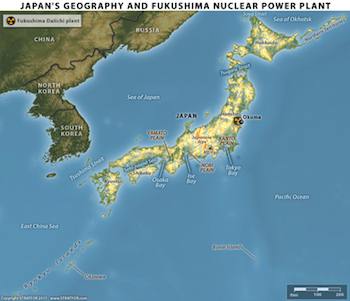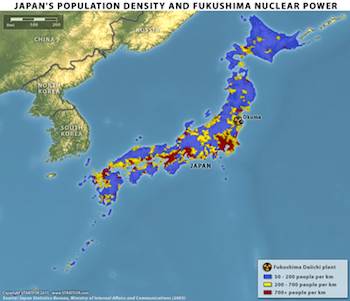- MENU
- HOME
- SEARCH
- WORLD
- MAIN
- AFRICA
- ASIA
- BALKANS
- EUROPE
- LATIN AMERICA
- MIDDLE EAST
- United Kingdom
- United States
- Argentina
- Australia
- Austria
- Benelux
- Brazil
- Canada
- China
- France
- Germany
- Greece
- Hungary
- India
- Indonesia
- Ireland
- Israel
- Italy
- Japan
- Korea
- Mexico
- New Zealand
- Pakistan
- Philippines
- Poland
- Russia
- South Africa
- Spain
- Taiwan
- Turkey
- USA
- BUSINESS
- WEALTH
- STOCKS
- TECH
- HEALTH
- LIFESTYLE
- ENTERTAINMENT
- SPORTS
- RSS
- iHaveNet.com
By Stratfor Alert
A March 12 explosion at the earthquake-damaged Fukushima Daiichi nuclear power plant in Okuma, Japan, appears to have caused a reactor meltdown.
The key piece of technology in a nuclear reactor is the control rods. Nuclear fuel generates neutrons; controlling the flow and production rate of these neutrons is what generates heat, and from the heat, electricity. Control rods absorb neutrons — the rods slide in and out of the fuel mass to regulate neutron emission, and with it, heat and electricity generation.
A meltdown occurs when the control rods fail to contain the neutron emission and the heat levels inside the reactor thus rise to a point that the fuel itself melts, generally temperatures in excess of 1,000 degrees Fahrenheit, causing uncontrolled radiation-generating reactions and making approaching the reactor incredibly hazardous. A meltdown does not necessarily mean a nuclear disaster. As long as the reactor core, which is specifically designed to contain high levels of heat, pressure and radiation, remains intact, the melted fuel can be dealt with. If the core breaches but the containment facility built around the core remains intact, the melted fuel can still be dealt with — typically entombed within specialized concrete — but the cost and difficulty of such containment increases exponentially.

Japan's Geography and Fukushima Nuclear Plant Credit: Stratfor
However, the earthquake in Japan, in addition to damaging the ability of the control rods to regulate the fuel — and the reactor’s coolant system — appears to have damaged the containment facility, and the explosion almost certainly did. There have been reports of “white smoke,” perhaps burning concrete, coming from the scene of the explosion, indicating a containment breach and the almost certain escape of significant amounts of radiation.
At this point, events in Japan bear many similarities to the 1986 Chernobyl disaster. Reports indicate that up to 1.5 meters (4.9 feet) of the reactor fuel was exposed. The reactor fuel appears to have at least partially melted, and the subsequent explosion has shattered the walls and roof of the containment vessel — and likely the remaining useful parts of the control and coolant systems.

Japan's Population Density Credit: Stratfor
And so now the question is simple: Did the floor of the containment vessel crack? If not, the situation can still be salvaged by somehow re-containing the nuclear core. But if the floor has cracked, it is highly likely that the melting fuel will burn through the floor of the containment system and enter the ground. This has never happened before but has always been the nightmare scenario for a nuclear power event — in this scenario, containment goes from being merely dangerous, time consuming and expensive to nearly impossible.
Radiation exposure for the average individual is 620 millirems per year, split about evenly between manmade and natural sources. The firefighters who served at the Chernobyl plant were exposed to between 80,000 and 1.6 million millirems. The Nuclear Regulatory Commission estimates that exposure to 375,000 to 500,000 millirems would be sufficient to cause death within three months for half of those exposed. A 30-kilometer-radius (19 miles) no-go zone remains at Chernobyl to this day. Japan’s troubled reactor site is about 300 kilometers from Tokyo.
The latest report from the damaged power plant indicated that exposure rates outside the plant were at about 620 millirems per hour, though it is not clear whether that report came before or after the reactor’s containment structure exploded.
Available at Amazon.com:
Aftermath: Following the Bloodshed of America's Wars in the Muslim World
Displacement and Dispossession in the Modern Middle East (The Contemporary Middle East)
The End of History and the Last Man
The Clash of Civilizations and the Remaking of World Order
The Tragedy of Great Power Politics
The End of the Free Market: Who Wins the War Between States and Corporations?
Running Out of Water: The Looming Crisis and Solutions to Conserve Our Most Precious Resource
Bottled and Sold: The Story Behind Our Obsession with Bottled Water
Water: The Epic Struggle for Wealth, Power, and Civilization
At War with the Weather: Managing Large-Scale Risks in a New Era of Catastrophes
Friendly Fire: Losing Friends and Making Enemies in the Anti-American Century
Dining With al-Qaeda: Three Decades Exploring the Many Worlds of the Middle East
Uprising: Will Emerging Markets Shape or Shake the World Economy
Republished with permission of STRATFOR www.stratfor.com
WORLD |
AFRICA |
ASIA |
EUROPE |
LATIN AMERICA |
MIDDLE EAST |
UNITED STATES |
ECONOMICS |
EDUCATION |
ENVIRONMENT |
FOREIGN POLICY |
POLITICS
World - Nuclear Meltdown at Quake-Damaged Japanese Plant | Global Viewpoint